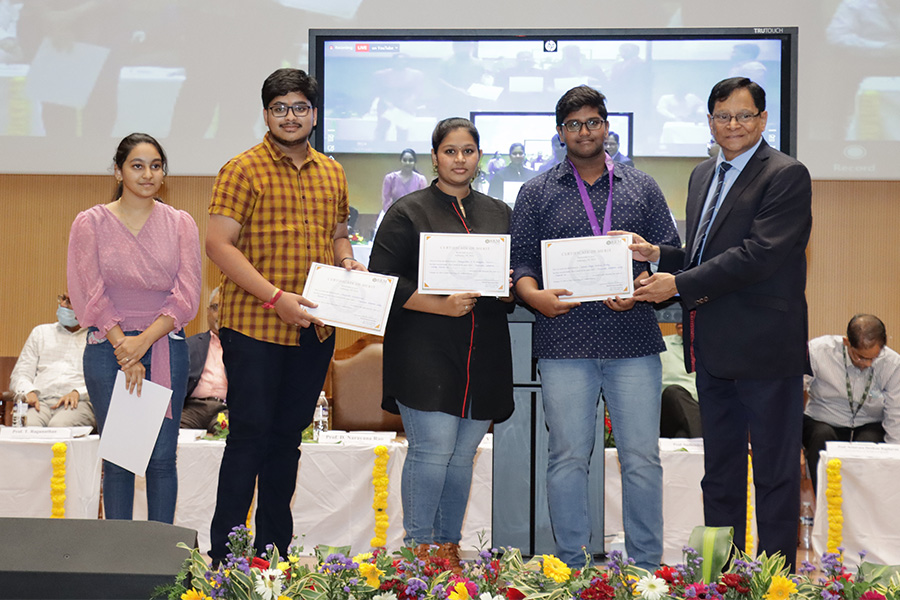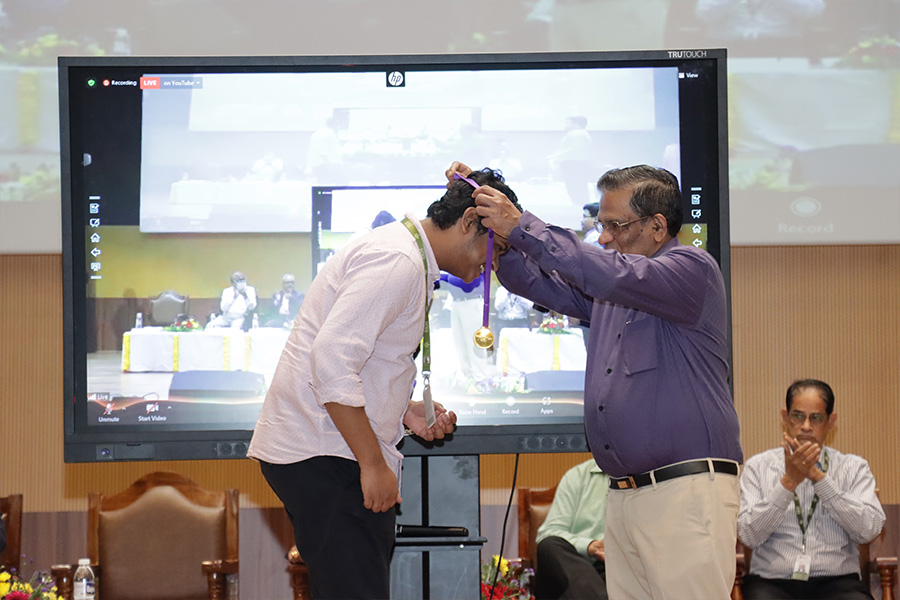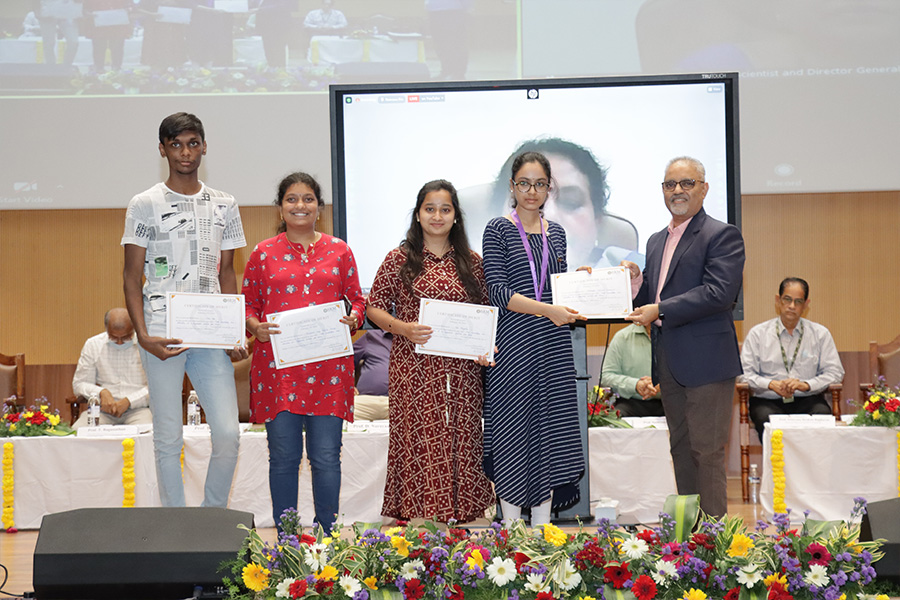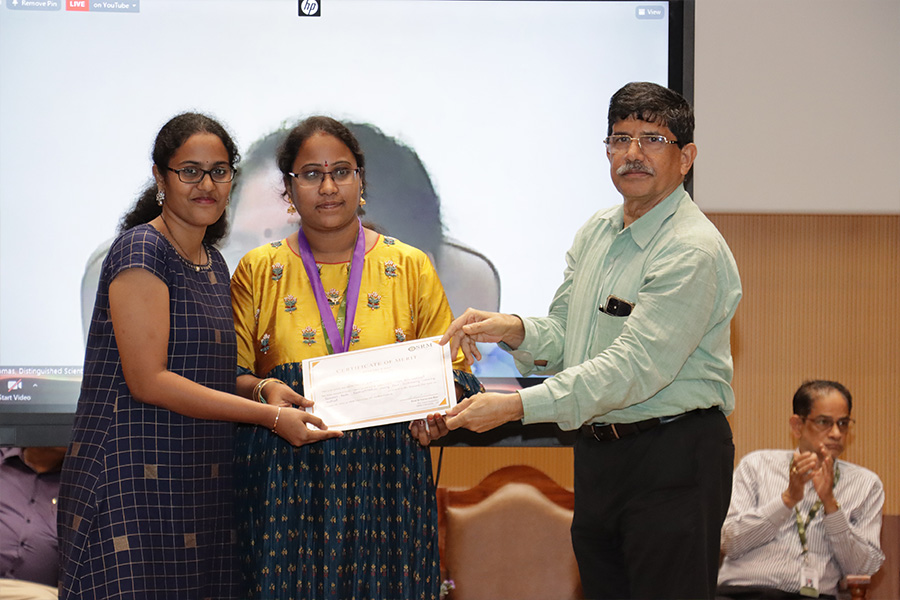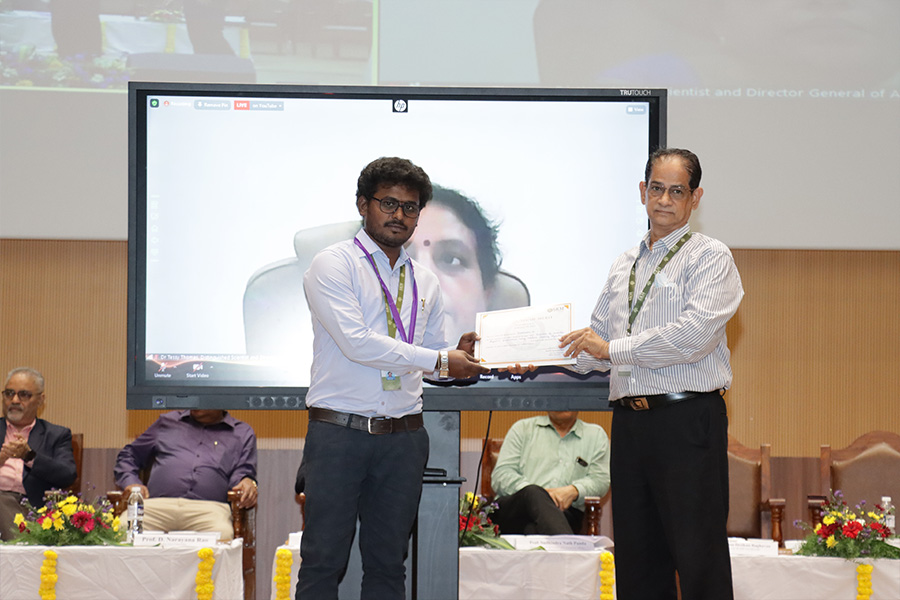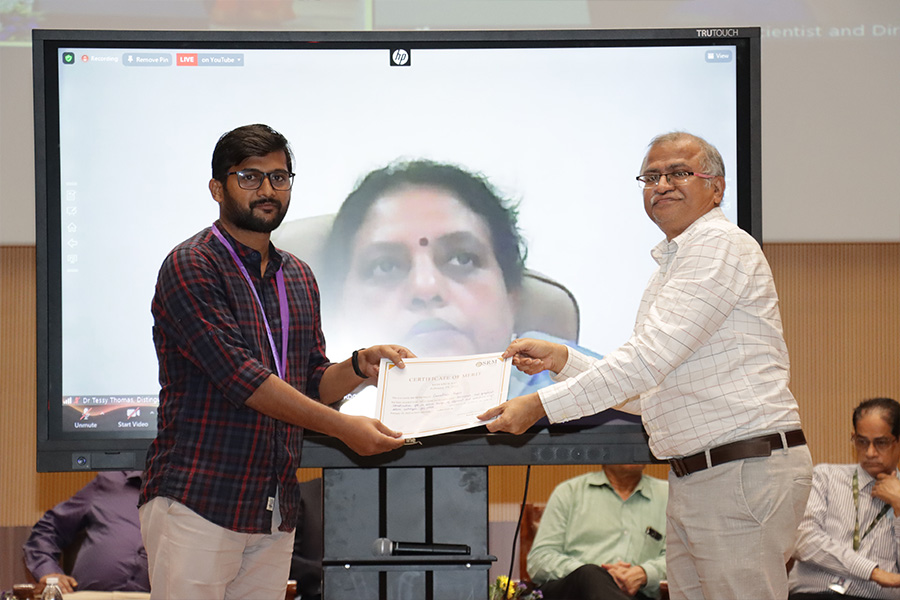SRM-AP All News
ALL News
- SRMAP receives SWAYAM-NPTEL ‘A’ rating February 23, 2022
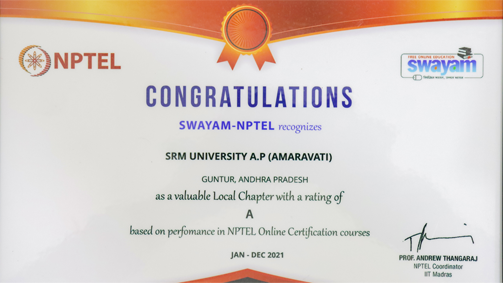 SRM University-AP is happy to announce that it was recognised by NPTEL SWAYAM as a valuable local chapter with an ‘A’ rating for the year Jan-Dec 2021. The rating is based on the performance of students who took the examinations for various SWAYAM courses.
SRM University-AP is happy to announce that it was recognised by NPTEL SWAYAM as a valuable local chapter with an ‘A’ rating for the year Jan-Dec 2021. The rating is based on the performance of students who took the examinations for various SWAYAM courses.SWAYAM has awarded a plaque to SRM University-AP and a certificate of appreciation to Dr Satya Pramod Jammy for his role as the university local Coordinator. It is a great achievement for the young university.
The philosophy behind this mode of education is to facilitate the curiosity of students who have an interest in the courses that transcend the conventional curriculum and give them a unique edge over their peers. SRM University-AP encourages students to study these from SWAYAM and other MOOCs available. Their performance in the examinations conducted by SWAYAM will earn them grades and credits. This was made available to the students for the first time in January 2021 which opened a plethora of opportunities to the students, and they have enjoyed this new learning possibility.
In the year 2021, a total of 470 students registered for various courses. The pass percentage is a whopping 90%, there are 17 students in the top 5%, 4 students in the top 2% and one student in the top 1% of their respective courses. 69 % (321) of the students are in Elite and higher categories. 5% students received Elite+gold award, 30% receiving Elite+silver and 35% receiving Elite certificates.
Dr Satya Pramod Jammy is pleased with all the students for their active participation and their brilliant performance. Obtaining an ‘A’ grade in the first year of implementation stands as a testament to the academic excellence of SRM University-AP. Dr Jammy is also thankful to all the department level coordinators, Dr Tapas, Dr Sreenivasulu, Dr Rajiv, Prof. Jayaseelan, Dr Malavika, Dr Ramanjaneya Reddy, and Dr Mong for encouraging the students and actively participating in the discussions. Mr V. Srinivasarao (Asst. Librarian) was instrumental in setting up SWAYAM in a short period.
Dr Jammy expressed his gratefulness to the Vice-Chancellor, Prof V. S. Rao, Deputy Dean Academic affairs Dr B. Siva Kumar and the entire University management for their support in making this a possible endeavour and its glorifying success.
- Juxtaposing Cross-Cultural Notions of Beauty February 23, 2022
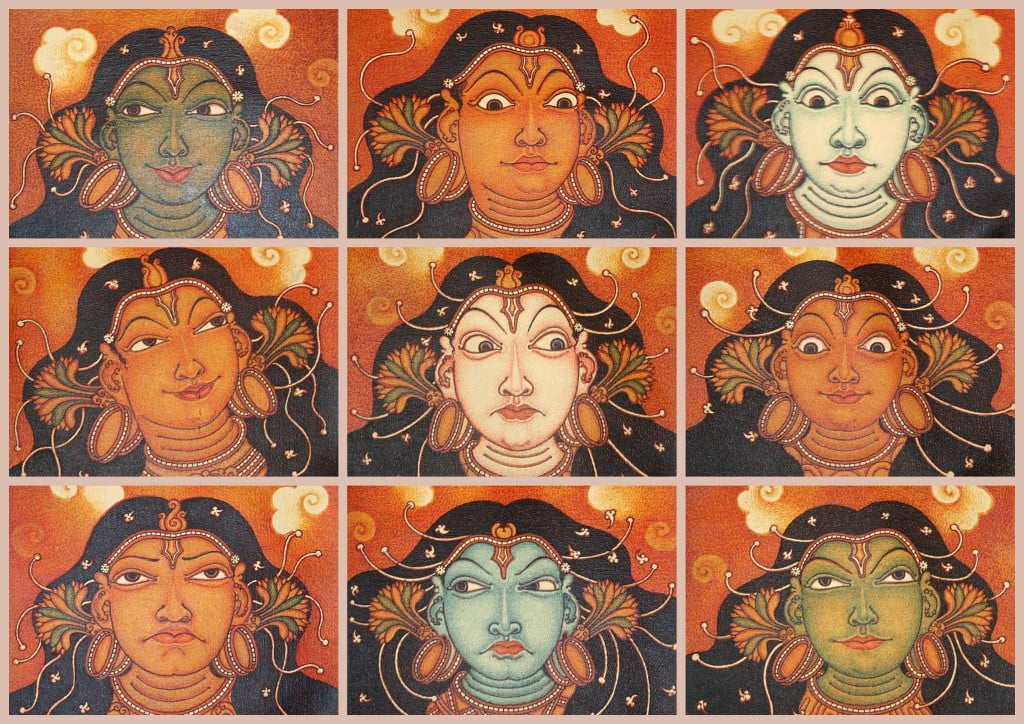 The School of Liberal Arts and Social Sciences is glad to announce that Dr Saurabh Todariya has published his paper titled “Aesthetic Delight and Beauty: A Comparison of Kant’s Aesthetics and Abhinavagupta’s Theory of Rasa” in the Journal of Dharma Studies published by Springer Nature. It is published in collaboration with Consciousness Studies Program, National Institute of Advanced Studies (IISc Campus), Bangalore.
The School of Liberal Arts and Social Sciences is glad to announce that Dr Saurabh Todariya has published his paper titled “Aesthetic Delight and Beauty: A Comparison of Kant’s Aesthetics and Abhinavagupta’s Theory of Rasa” in the Journal of Dharma Studies published by Springer Nature. It is published in collaboration with Consciousness Studies Program, National Institute of Advanced Studies (IISc Campus), Bangalore.Anything that is pleasurable to perceive is defined as beautiful. However, the notion of beauty takes different interpretations with respect to the lens it is viewed through. It is either rooted in one’s personal feelings or by virtue of something universal residing in the object. Through his paper, Dr Todariya seeks to explore this question by comparing the Philosophy of German Philosopher, Kant and the great Indian Philosopher of the 9th Century, Abhinavagupta. He proposes that appreciation of beauty is only possible when the personal and egoistic involvement is suspended with respect to the beautiful object.
The research is significant in the domain of cross-cultural philosophy and looks into aesthetics from a philosophical point of view, relatively an underexplored area in Indian Academia. Dr Todariya also aims to work on comparative aesthetics, especially on the notion of Hermeneutics and Art in Indian and Western Aesthetics in the future.
Abstract of the Research
The study aims to address the existing research gap through a thematic comparison between the aesthetics of Kant and Abhinavagupta. This paper explores Kant’s notion of aesthetic judgment based on disinterestedness with Abhinavagupta’s analysis of sādhāraṇīkaraṇa. We argue that the notions of “disinterested judgment” in Kant and sādhāraṇīkaraṇa in Abhinavagupta point towards the impersonal nature of aesthetic delight which makes the universality of aesthetic experience possible. Hence, aesthetics in both Kant and Abhinavagupta are not the personal and subjective experience, but a kind of universality based on the ability to experience impersonal joy. However, the notion of aesthetic delight in Kant is confined to the agreeable mental states only, while in Abhinavgupta the notion of rasa includes both positive as well as the negative mental states like fear, disgust, etc. In this regard, the paper will also analyse the affinity between the notion of sensus communius in Kant and sahṛdaya in Abhinavagupta which highlights the importance of aesthetic community and the impersonal nature of aesthetic delight.
- Agni Putri Dr Tessy Thomas addressed SRM University-AP on Research day February 20, 2022
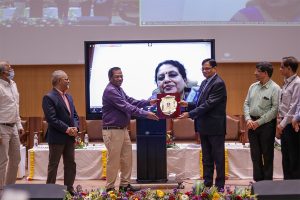 The fourth edition of Research Day at SRM University-AP was held on Saturday, February 19, 2022. The missile woman of India, Dr Tessy Thomas appreciated the efforts of SRM AP in entering into new areas of research and encouraged the scholars to contribute to the country’s growth by developing indigenous technologies. The Research day is conducted as a breakthrough opportunity for the faculty members, research scholars and students of SRM University-AP to exchange and exhibit their ideas on research.
The fourth edition of Research Day at SRM University-AP was held on Saturday, February 19, 2022. The missile woman of India, Dr Tessy Thomas appreciated the efforts of SRM AP in entering into new areas of research and encouraged the scholars to contribute to the country’s growth by developing indigenous technologies. The Research day is conducted as a breakthrough opportunity for the faculty members, research scholars and students of SRM University-AP to exchange and exhibit their ideas on research.In her keynote address, Dr Thomas explicated that the DRDO’s efforts positioned the nation among the top few countries in the world with multilevel strategic capability. These include the Agni series, anti-ballistic missile programmes, underwater weapon systems, main battle tanks, multi-range radar systems, electronic warfare, fighter aircraft, Light Combat Aircraft and its variants, and airborne early warning and control systems.
Delivering the welcome address, Prof D Narayana Rao, Pro-Vice-Chancellor, SRM University – AP highlighted that India needs to gradually move from a net consumer of knowledge to a net producer of knowledge as India emerges as one of the world’s largest economies.“Therefore, SRM University-AP provides faculty members and research scholars the required support to carry out research in new domains of knowledge” he added. He further talked about the 25 years vision of SRM University-AP in research and development starting from 2022 to 2047. During the next 25 years, the faculty members and research scholars of SRM AP will pursue significant and outstanding research in the areas of water resources and management, blue economy, self-diagnostic medical devices, new-age medicine, hydrogen as a potential replacement of fossil fuels and many more novel branches of scientific knowledge.
University Vice-Chancellor Prof V S Rao recollected the interaction he had with Dr Tessy Thomas in BITS Pilani Hyderabad campus and invited Dr Thomas to visit the SRM University-AP campus physically to converse with the students. During interaction with students and faculty members, Dr Tessy Thomas elaborated how industrial and academic collaborations facilitate the development of indigenous technologies.
Among 285 submissions from students and from the faculty community of SRM AP on various thematic areas, selected papers were awarded gold and silver medals. Prof V S Rao, Vice-Chancellor; Prof D Narayana Rao, Pro-Vice-Chancellor; Prof Sudhindra Nath Panda, Dean – Faculty & Academic Affairs; Prof B V Babu, Dean-School of Engineering and Sciences; Prof R S Desikan, Associate Dean-in-charge, School of Liberal Arts and Social Sciences (SLASS) & School of Entrepreneurship and Management Studies (SEAMS); Prof T Ragunathan, Associate Dean-in-Charge (Engineering)-School of Engineering and Sciences gave away the medals and certificates. Further, a special issue of abstracts that comprises all the submitted abstracts was unveiled on behalf of Dr Tessy Thomas for public readership.
Dr Murali Krishna Enduri, Assistant Professor, Department of Computer Science Engineering was the convener and Dr Anandarao Suvvari, Assistant Professor, Department of Economics; Dr Sabyasachi Chakrabortty, Assistant Professor, Department of Chemistry; and Dr Lakshmi Sirisha Maganti, Assistant Professor, Department of Mechanical Engineering were the co-conveners of the Research Day-2022.
Continue reading → - Molybdenum as the next-generation catalyst February 19, 2022
 The Department of Environmental Science is proud to announce that Dr Lakhveer Singh has published his paper titled, “Progressions in cathodic catalysts for oxygen reduction and hydrogen evolution in bioelectrochemical systems: Molybdenum as the next-generation catalyst” in a prestigious journal Catalysis Review with a high Impact Factor of 20.21.
The Department of Environmental Science is proud to announce that Dr Lakhveer Singh has published his paper titled, “Progressions in cathodic catalysts for oxygen reduction and hydrogen evolution in bioelectrochemical systems: Molybdenum as the next-generation catalyst” in a prestigious journal Catalysis Review with a high Impact Factor of 20.21.The article is published in collaboration with NCL Pune, Hong Kong Baptist University, and VITO-Flemish Institute for Technological Research, Belgium.
Abstract of the Research
Oxygen reduction reactions (ORR) are unanimously a key factor of system performances in bioelectrochemical systems (BESs), low-temperature fuel cells, and generally in several electro-chemical platforms. Platinum (Pt)-based catalyst is the finest electrocatalyst for ORR in BESs; however, it is constrained by its low abundance, high price, and poor catalytic durability in an electrochemical setup for cathodic reaction kinetics. Molybdenum (Mo) with its multi-dimensional form as 2D and 3D layers and synergistic combination with other non-metals offers prospects of extraordinary performance as a low-cost metal-based ORR catalyst over the Pt in delivering enhanced ORR potential.
About the Research
This article throws light on the current requirements of sturdier catalyst material and thus provides a comprehensive review of the continuing efforts in exploring the possibility of Mo as a low-cost metal-based ORR catalyst for sustainable energy production.
Mo-based catalysts have been now widely used for their applications in environmental and energy-based catalysis due to the low cost of Mo, high stability, and excellent activity.
In the future, Dr Lakhveer Singh and his collaborators are working on overcoming limitations to fabricate durable, stable, and catalytically active micro/nanoscale two-dimensional MoS2-based cathodes at an industrial scale, commercial bioelectrochemical devices can be obtainable in future.
- Tenancy and Credit: Exploring Facts below the Crust in AP February 19, 2022
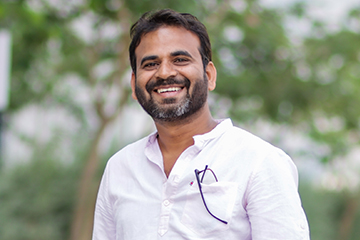 SRM University-AP is proud to announce that Dr Ghanshyam Kumar Pandey, Department of Economics, has received the prestigious NABARD (National Bank for Agriculture and Rural Development) grant of Rs 14.85 lacs for a duration of 10 months of active research on “Tenancy and Credit: Exploring Facts below the Crust in AP”.
SRM University-AP is proud to announce that Dr Ghanshyam Kumar Pandey, Department of Economics, has received the prestigious NABARD (National Bank for Agriculture and Rural Development) grant of Rs 14.85 lacs for a duration of 10 months of active research on “Tenancy and Credit: Exploring Facts below the Crust in AP”.About the Research
The study will attempt to identify different possible sources of credit of agriculture households in the Guntur district of AP and then an analysis of the impact at the macro level will be carried out. The role of self-help groups and microfinance on agriculture and livelihood will be one important component of this analysis. Transaction cost, cascading effect, and loan waiver impact will be estimated across tenant and owner cultivators, and social groups.
The study will help to understand the improvement in the life of tenants due to the adoption of the ‘Model Tenancy Act’ and provide feedback on the Tenancy Certificate introduced in AP for enabling farmers to access bank/formal credit and whether the formation of JLGs has led to increase in the credit availability to tenants or not.
The project will help understand the sociological impact of economic decisions by the governance and help direct policies to more beneficial outcomes especially in terms of Tenancy and Credit.
- ‘Super Randonneur’ title for SRM AP student, Saiprasad Koneru for remarkable talent in cycling February 18, 2022
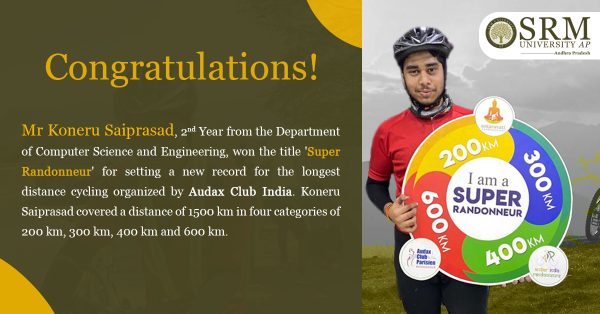 Amravati, February 16, 2022
Amravati, February 16, 2022SRM University-AP’s Computer Science Engineering student Koneru Saiprasad won the ‘Super Randonneur’ title for his outstanding talent in cycling. Saiprasad recently set a new record for the longest distance cycling organized by Audax Club India with its headquarters in Guntur, shortly after reaching the target.
Saiprasad elaborated his quest with a beaming note, “On November 6, we cycled from Vijayawada to Nallajerla for 13 hours and then back to Vijayawada (200 km). Similarly, on November 27, he cycled from Vijayawada to Suryapeta on the Hyderabad route for 20 hours and then back to Vijayawada (300 km). He cycled from Vijayawada to Nakrekal for 27 hours on December 18 and back to Vijayawada (400 km). A week ago, he cycled from Guntur to Ramoji Film City and back to Guntur (600 km) in 40 hours, setting a record.”
Saiprasad won the ‘Super Randonneur’ title reserved for those who complete these four events. Saiprasad informed that he has loved cycling since he was a child and focused on long-distance cycling during lockdowns. He dedicated his achievement to his parents and university professors for their support and encouragement in all possible ways.
Continue reading → - Vision-based fall detection AI February 17, 2022
Human-like care is difficult to replicate. Due to the lack of a reliable vision-based fall detection AI, it is often more effective to assign a lot of manpower towards vision-based detections that have not been efficiently implemented.
Ms Inturi Anita Rani, Research Scholar in the Department of Computer Science Engineering, working with her supervisor, Dr V. M. Manikandan, has worked on a paper titled, “A Novel Vision-Based Fall Detection Scheme using Keypoints of Human-Skeleton with Long Short-term Memory Network” in the Arabian Journal for Science and Engineering published by Springer with an Impact Factor of 2.33.
Abstract of the research:
Humans are skilled at visually recognizing and classifying actions in videos, but it’s tough to automate this process. Human action detection in videos is useful in applications like automated surveillance, assisted living, human-computer interaction, content-based video retrieval, and video summarization. The ability to recognize atomic actions like “walking,” “bending,” and “falling” is critical for activity analysis when monitoring elderly people’s daily activities. Our paper presents a new promising solution for fall detection using vision-based approaches. In this approach, we analyse the human joint points which are the prime motion indicators. A set of keypoints of the subject are acquired by applying the AlphaPose pre-trained network. These keypoints are inferred to be the joint points of the subject. The acquired keypoints are processed through a framework of convolutional neural network (CNN) layers. Here, the spatial correlation of the keypoints is analysed. The long-term dependencies are then preserved with the help of long short-term memory (LSTM) architecture. Our system detects five types of falls and six types of daily living activities. We used the UP-FALL detection dataset for validating our fall detection system and achieved commendable results when compared to the state-of-the-art approaches. For comparison, we employed the OpenPose network for keypoint detection. It is inferred from the results that the AlphaPose network is more precise in keypoint detection.
About the research paper:
In this paper, the author proposes a vision-based system that is capable of detecting various types of falls accurately through video processing with the help of a machine learning approach.
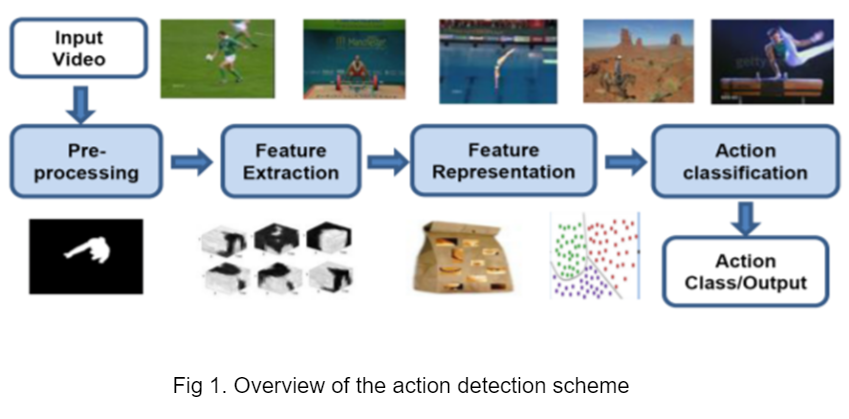
Implementation of the research:
The proposed scheme can be used to monitor the activity of elderly people and if any unusual falls happen, the information can be shared with caretakers to ensure emergency services.
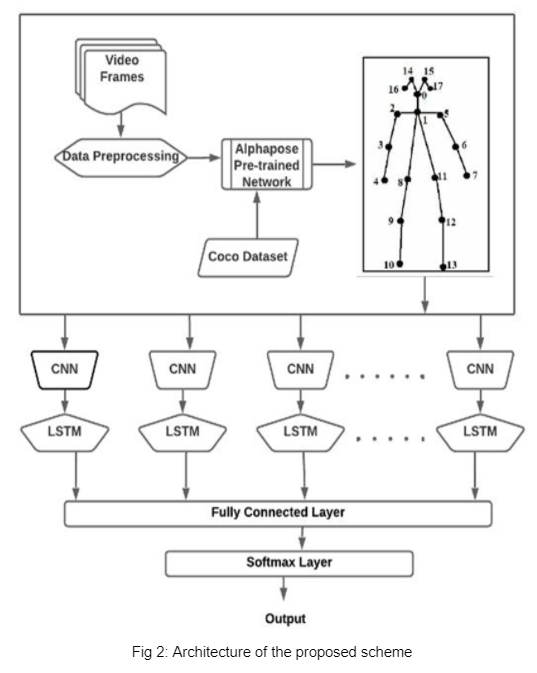
- SRM University-AP publishes as the lead author among 21 co-authors from 13 countries February 14, 2022
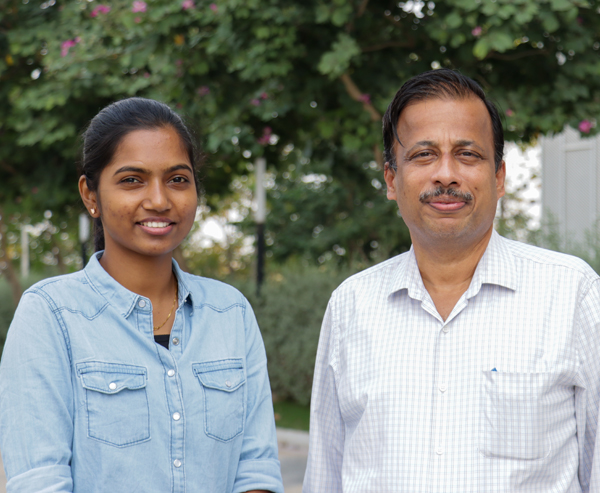 “Progress in Alternative Strategies to Combat Antimicrobial Resistance: Focus on Antibiotics” is a paper authored by Prof Jayaseelan Murugaiyan, Professor & Head, Department of Biological Sciences at SRM University-AP and his research scholar Ms Saranya Adukkadukkam, in Antibiotics Journal, having an impact factor of 4.639. It is a remarkable achievement that our university served as the first and the corresponding authors of this paper published in association with “Global AMR Insights Ambassadors Network”. A total of 21 co-authors from 13 countries (India, UK, France, The Netherlands, Switzerland, Italy, Spain, Ukraine, Lebanon, Egypt, Uganda, Bangladesh, and Nigeria) and six Indian universities (including SRM AP) participated in this work.
“Progress in Alternative Strategies to Combat Antimicrobial Resistance: Focus on Antibiotics” is a paper authored by Prof Jayaseelan Murugaiyan, Professor & Head, Department of Biological Sciences at SRM University-AP and his research scholar Ms Saranya Adukkadukkam, in Antibiotics Journal, having an impact factor of 4.639. It is a remarkable achievement that our university served as the first and the corresponding authors of this paper published in association with “Global AMR Insights Ambassadors Network”. A total of 21 co-authors from 13 countries (India, UK, France, The Netherlands, Switzerland, Italy, Spain, Ukraine, Lebanon, Egypt, Uganda, Bangladesh, and Nigeria) and six Indian universities (including SRM AP) participated in this work.Antimicrobial resistance (AMR) – the ability of microorganisms to survive antimicrobials – is a global healthcare concern. AMR contributes to 1.27 million deaths among the 4.95 million deaths associated with bacterial AMR. If no control measures are taken, it is estimated that by 2050, it will claim the lives of 300 million people. The rise of these “superbug bacteria’s” – means that trivial medical interventions will soon become once again high-risk since no efficient antimicrobial chemotherapy is available. It is, therefore, crucial to understand the current situation and identify alternatives to combat the emergence and spread of antimicrobial resistance. This paper comprehensively discusses the alternative approaches that can be effectively utilised to combat AMR and, at the same time, without inducing further resistance among the pathogens. The paper has great social implications in making society aware of the scenario and encouraging the researchers to focus on alternative strategies to combat AMR.
Abstract of the paper: Antibiotic resistance, and, in a broader perspective, antimicrobial resistance (AMR), continues to evolve and spread beyond all boundaries. As a result, infectious diseases have become more challenging or even impossible to treat, leading to an increase in morbidity and mortality. Despite the failure of conventional, traditional antimicrobial therapy, in the past two decades, no novel class of antibiotics has been introduced. Consequently, several novel alternative strategies to combat these (multi-) drug-resistant infectious microorganisms have been identified. The purpose of this review is to gather and consider the strategies that are being applied or proposed as potential alternatives to traditional antibiotics. These strategies include combination therapy, techniques that target the enzymes or proteins responsible for antimicrobial resistance, resistant bacteria, drug delivery systems, physicochemical methods, and unconventional techniques, including the CRISPR-Cas system. These alternative strategies may have the potential to change the treatment of multi-drug-resistant pathogens in human clinical settings.
Global AMR Insight Ambassador Network: AMR Insights, an international network-based organisation interacting with professionals around the globe: in Human and Veterinary Health, Agri-food and Environment, was set up in 2017 following an in-depth feasibility study towards a new information platform on AMR. It mainly focuses on informing, educating and connecting people with the aim to curb antimicrobial resistance. Prof Jayaseelan Murugaiyan and Ms Saranya Adukkadukkam are members of the Global AMR Insights Ambassador Network.
Ms Saranya Adukkadukkam, the co-author from SRM AP says:
The guidance of Prof Jayaseelan Murugaiyan is the pillar of my research. His support and passion for research always encourage me. He gives importance to translational research and motivates me to stand unique in the field. He shows me a path where I can serve the people through research. Foreseeing my future as a scientist, he guides me to more opportunities to collaborate with international scientists. I feel proud of my mentor Prof Jayaseelan Murugaiyan for letting me fly. Also, I thank SRM University-AP for providing generous fellowship, excellent research facilities and ambience to carry out the research.
- Budget Panel Discussion 2022-23 February 10, 2022
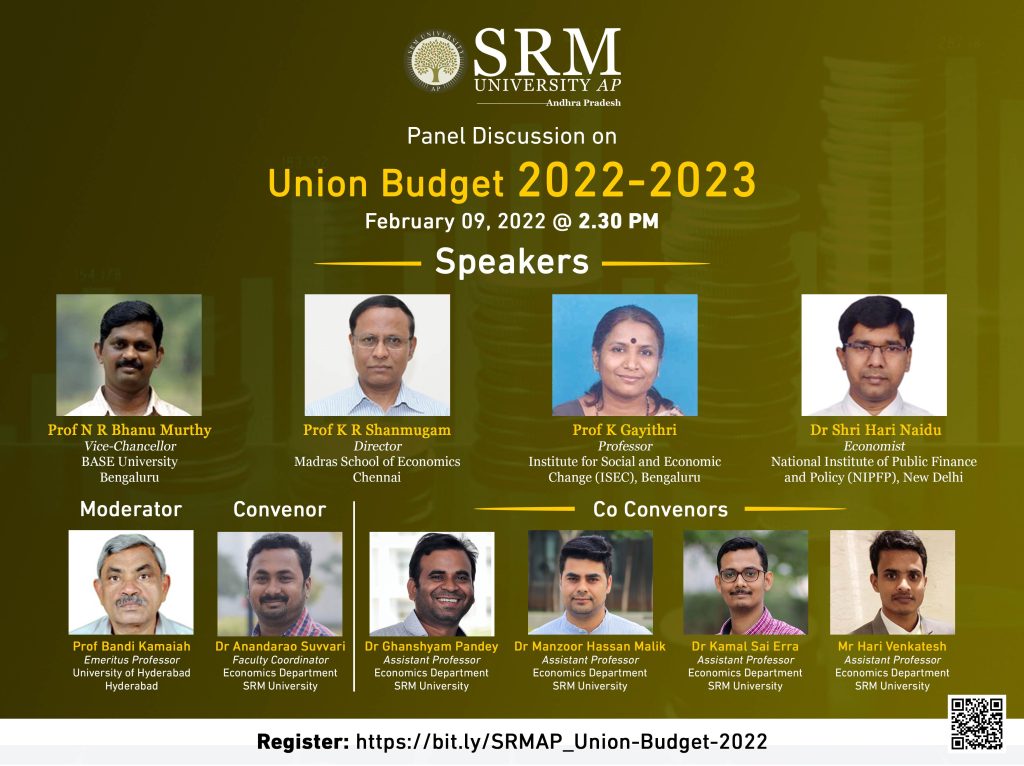 The Department of Economics of SRM University-AP, Andhra Pradesh, conducted a Panel Discussion on February 09, 2022, for the much needed and relevant in-depth analysis of the Union Budget proposed by the Finance Minister in the parliament on February 01, 2022.
The Department of Economics of SRM University-AP, Andhra Pradesh, conducted a Panel Discussion on February 09, 2022, for the much needed and relevant in-depth analysis of the Union Budget proposed by the Finance Minister in the parliament on February 01, 2022. Professor Bandi Kamaiah was the moderator of the event, and Dr Anandarao Suvvari, the faculty coordinator of the Department of Economics in the University, organised this discussion, inviting four eminent public finance economists of India, Prof N R Bhanu Murthy, Vice-Chancellor, BASE University, Bengaluru; Prof K R Shanmugam, Director, Madras School of Economics, Chennai; Prof K Gayathri, Professor, Institute for Social and Economic Change (ISEC), Bengaluru; Dr Shri Hari Naidu, Economist, National Institute of Public Finance and Policy (NIPFP), New Delhi. The co-convenors of the event were Dr Ghanshyam Pandey, Dr Manzoor Hassan Malik, Dr Kamal Sai Erra, Dr Hari Venkatesh from the Department of Economics SRM-AP.
The discussion started with a brief overview and essence of the Union budget by Dr Anandarao Suvvari, followed by Prof Bandi Kamaiah. Then first panellist Prof N R Bhanu Murthy, who our Indian Finance Minister also quoted, spoke about how the current budget is a continuation of the previous budget and emphasised more on the capital expenditure, which is the route to growth. He highlighted that the government should bring efficiency in public expenditure and expressed that the public policymakers side-lined the public debt number to GDP ratio at both central and state levels. An issue identified by Prof Murthy was bringing in many commodities under the customs tariff line and how doing this will have a negative impact on the exports. Further, he mentioned the ignorance towards the health and education sectors by a reduction in the allocation of expenditure for the same.
The second panellist Prof K R Shanmugam, gave a very detailed look at the budget, sector by sector, pointing out the benefits and the concerns related to each of them. He gave us a brief look at how the Indian economy has been doing for the past few years and gave an analysis taking this into consideration and stated that the budget had provided necessary fiscal stimuli through an increase in capital expenditure for the revival of the economy.
The third panellist Prof K Gayathri highlighted the philosophy of policy implications of budget and the need for a continuous process for analysing it. She also focused on the need for scientificity for estimates and the need for a sustainable approach for the budget. She pointed out that the current budget was future-looking in line with the vision for India 100 and that it put thorough emphasis on capacity building inclusive development by involving all stakeholders and modern infrastructure while expressing concern over effective implementation of policies.
The final panellist, Dr Shri Hari Naidu, discussed the revenue side of the budget thoroughly while focusing on the new taxation regime, other and legitimising crypto assets and digital Indian currency. In addition to this, Dr Naidu commented on the budget that the tax GDP ratio has been stagnant for the past two decades also, it has not been addressed in the budget, and despite the fact that there were a lot of tax reforms, the tax bases needed to be expanded.
After individual reviews by the panellists, questions posed by the students and the co-convenors were answered, followed by an interactive and engaging discussion among panellists, moderator, convenor and co-convenors on various issues spanning from the way of analysing the budget, trade-offs between debt and capital expenditure, debt sustainability, control mechanisms, the process of allocation, outcome evaluation or impact of the budget and the need for reality and effectiveness of planned budget on the ground level.
The session, after a thorough discussion on the union budget, was concluded by a vote of thanks proposed by Asst. Prof. Dr Hari Venkatesh to the esteemed panellists, moderator, convenor, co-convenors and all the people who made this session successful for contributing their precious time and valued efforts.
Continue reading → - Dr Azizuddin Khan deliberated upon Medication Adherence February 5, 2022
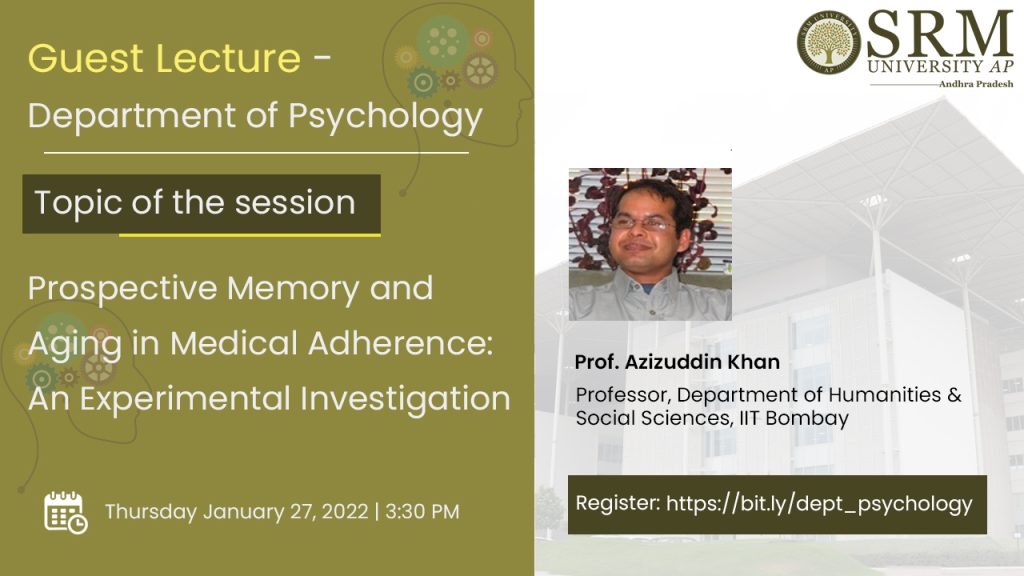 Department of Psychology, SRM University, AP-Andhra Pradesh organised a guest lecture on the topic “Prospective Memory and Aging in Medication Adherence: An Experimental Investigation” on January 27, 2022, from 3:30 to 4:30 pm. Dr Azizuddin Khan, Professor, Department of Humanities and Social Sciences, Indian Institute of Technology-Mumbai, attended the session as the eminent speaker.
Department of Psychology, SRM University, AP-Andhra Pradesh organised a guest lecture on the topic “Prospective Memory and Aging in Medication Adherence: An Experimental Investigation” on January 27, 2022, from 3:30 to 4:30 pm. Dr Azizuddin Khan, Professor, Department of Humanities and Social Sciences, Indian Institute of Technology-Mumbai, attended the session as the eminent speaker. The session started with a brief introduction of Prof Khan by Mrs Ayesha Parveen Haroon, Lecturer, Department of Psychology. Thereafter, Prof Khan delivered his lecture wherein he deliberated upon the medical adherence, aging and prospective memory as well as the factors affecting medical adherence. Specifically, he emphasised the effect of memory and intellectual abilities on medical adherence. Following Prof Khan’s presentation, the questions raised by the audience were communicated to Prof Khan by Dr Aehsan Ahmad Dar, Assistant Professor, Department of Psychology. Prof Khan provided interesting insights on the questions raised. The programme ended with the vote of thanks delivered by Dr Ninad Patwardhan, Assistant Professor and Faculty Coordinator, Department of Psychology.
Continue reading →


